The impetus for this project came from colleagues in musicology who protested at the absence of any discussion of music in my earlier work on sung texts, and then encouraged me as I inched toward addressing their concerns. I should like in particular to thank Sam Barrett, Susan Boynton, Mary Channen Caldwell, Larry Earp, Mark Everist, Elizabeth Leach, Evan McCarthy, Judith Peraino, and Anne Stone for their hospitable responses to my efforts. The form this book eventually took owes an equal debt to colleagues in literature and thought, and notably to Gaia Gubbini, Nicholas Hammond, Ruth Harvey, Timothy Mathews, Franois Noudelmann, and Simone Ventura. More people than I can name engaged generously with what is euphemistically called work in progress, but I would like especially to thank Simon Gaunt, Elizabeth Leach, and Stephen Dembski for their insightful comments on the chapters they were kind enough to read. The deaths of Stephen and Simon at different times as this book was being produced are much mourned. And I cannot overstate how much I owe to the students I have been fortunate enough to work with over the last decade of mulling this project, notably Terrence Cullen, Emily Kate Price, Maria Sanchez-Reyes, and Kate Travers.
The research for this book was enabled by New York University, which I thank for generous research funding, a stimulating fellowship at NYU Berlin, and ever gracious administrative support. NYUs Center for the Humanities contributed significant funding toward making recordings for the website. I also want to thank the journals in which some of the material and ideas presented here first appeared. Some of chapter 4 was originally published in Circulating Air: Inspiration, Voice and Soul in Poetry and Song, Paragraph 41, no. 1 (2018): 1025, while parts of chapter 5 appeared in Siren Enchantments, or, Reading Sound in Medieval Books, SubStance #152, 49, no. 2 (2020): 10832, and Chant et enchantement dans luvre de Guillaume de Machaut. Mtamorphoses du risque et du dsir, Revue des Langues Romanes 118, no. 2 (2014): 44768. A number of colleagues generously allowed me to cite unpublished work: my thanks for this courtesy to Rachel Bowlby, Larry Earp, Grard Gouiran, and Anne Stone. It has been a distinct pleasure to work again with Cornell University Press. Mahinder Kingra is an exemplary editor, and the readers he commissioned to report on my typescript went above and beyond to provide help and guidance. I thank them for engaging so constructively with the constitutive hybridity of this project, combining as it does a book on the sound of song by a nonmusician with a set of recordings by professional ones.
In this connection, my warmest thanks of all must go to Christopher Preston Thompson, who, when I approached him with tentative suggestions for recording performances of the songs I was writing about, generously embraced my proposal in the spirit of research and experimentation in which it was meant, and took it in directions I could not have foreseen. Since then he has become not only the lead performer but also the impresario and director of the companion website. To him I owe the privilege of thanking the musicians of the ensemble Concordian Dawn, of which he is the founder and artistic director; videographer Oliver Weston; visual artist Benjamin Thorpe; and, crucially, sound engineer Richard Price, whose work for us has been outstanding. Christopher also raised money to meet the performance fees of Concordian Dawn musicians from the JQW Fund and from Chamber Music America. Heartfelt thanks, finally, to Anne Stone for the advice and support she has so unstintingly given our collaboration.
Abbreviations
ALD Aristoteles Latinus Database (Brepols, 2009 )
BEdT Bibliografia elettronica dei trovatori (http://www.bedt.it/BEdT_04_25/index.aspx)
BL British Library, London
BnF Bibliothque nationale de France, Paris
CFMA Cahiers franais du Moyen ge
COM Concordance de loccitan mdival (CD Rom, Brepols, 2005)
DEAF Dictionnaire tymologique de lancien franais (https://deaf-server.adw.uni-heidelberg.de/)
DMLBS Dictionary of Medieval Latin from British Sources (http://www.dmlbs.ox.ac.uk/web/online.html)
DMF Dictionnaire du moyen franais (http://zeus.atilf.fr/dmf/)
DOM Dictionnaire de loccitan mdival (http://www.domen-ligne.de/)
NB sterreichische Nationalbibliothek, Vienna
PC Bibliographie der Troubadors, ed. Alfred Pillet and Henry Carstens (Niemeyer, 1933)
RS Hans Spanke, G. Raynauds Bibliographie des altfranzsischen Liedes, neu bearbeitet und ergnzt (Brill, 1980)
SATF Socit des anciens textes franais
TL Adolf Tobler and Erhard Lommatzsch, eds., Altfranzsisches Wrterbuch (Steiner, 1955 )
Primary sources
Note: entries begin with the form(s) by which I refer to an author or work, followed by those used in the edition cited. Anonymous songs and songs of contested attribution are listed by incipit, anonymous works or works of contested attribution by title. English translations follow after editions of original texts.
Aimeric de Peguilhan. The Poems of Aimeric de Peguilhan. Edited by William P. Shepard and Frank M. Chambers. Evanston, IL: Northwestern University Press, 1950.
Albert the Great [Albertus Magnus]. Albert the Great, De anima. Selections on the Internal Senses. Translated by Deborah L. Black. Unpublished, Deborah L. Black, Toronto. Available at http://individual.utoronto.ca/dlblack/WebTranslations/albimagdeanima.pdf.
. De anima. In Omnia Opera, vol. VII, part 1, edited by Clemens Stroick. Monasterium Westfalorum (= Mnster): Aschendorff, 1968.
. On Animals. A Medieval Summa Zoologica. Translated by Kenneth K. Mitchell Jr. and Irven Michael Resnick. 2 vols. Baltimore: Johns Hopkins University Press, 1999.
Analecta hymnica medii aevi. Edited by Guido Maria Dreves and Clemens Blume. Leipzig: Fues, 18861922.
Aquinas, Thomas. In Aristotelis Librum de anima commentarium. Edited by P. F. Angeli and M. Pirotta. Turin: Marietti, 1959.
. Aristotles De anima in the Version of William of Moerbeke and the Commentary of St Thomas Aquinas. Translated by Kenelm Foster. New Haven, CT: Yale University Press, 1951.
Aratus. Phaenomena. In Callimachus: Hymns and Epigrams; Lycophron; Aratus. Translated by A. W. Mair. Loeb Classical Library. Cambridge, MA: Harvard University Press, 2015.
Aristotle. The Complete Works of Aristotle: The Revised Oxford Translation. Edited by Jonathan Barnes. 2 vols. Princeton, NJ: Princeton University Press, 1984.
Arnaut Daniel. Canzoni. Edited by Gianluigi Toja. Florence: Sansoni, 1961.
Avicenna. Canon: A Treatise on The Canon of Medicine of Avicenna: Incorporating a Translation of the First Book. Presented by O. Cameron Gruner. London: Luzac, 1930.
. De anima. In Avicenna latinus. Liber de anima seu sextus de naturalibus IIIIII. Edited by S[imone] van Riet. Louvain: Peeters & Leiden: Brill, 1972; Avicenna latinus. Liber de anima seu sextus de naturalibus IVV. Edited by S[imone] van Riet with introduction by G. Verbeke. Louvain: Editions Orientalistes / Leiden: Brill, 1968.
Bernart de Ventadorn. Bernard de Ventadour, Chansons damour. Edited by Mosh Lazar. Paris: Klincksieck, 1966.
Bernart Marti. Il trovatore Bernart Marti. Edited by Fabrizio Beggiato. Modena: Mucchi, 1984.
Boethius [Anicius Manlius Severinus Boethius]. The Consolation of Philosophy. Philosophiae consolationis libri quinque. Edited by Karl Bchner. Editiones Heidelbergenses. Heidelberg: Winter, 1977. Translated with an introduction by V. E. Watts. Harmondsworth, UK: Penguin, 1969.

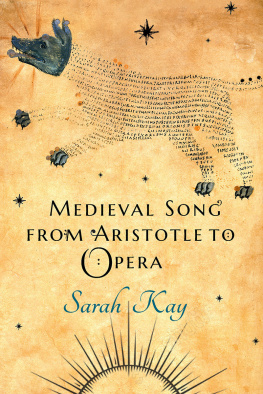
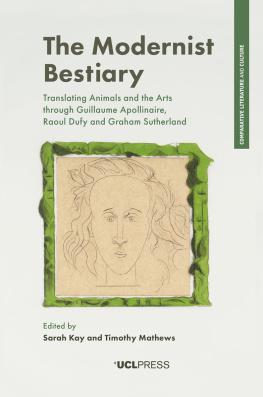
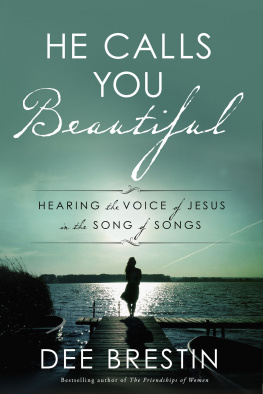
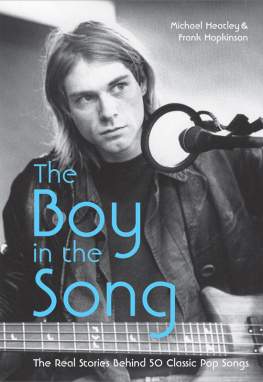

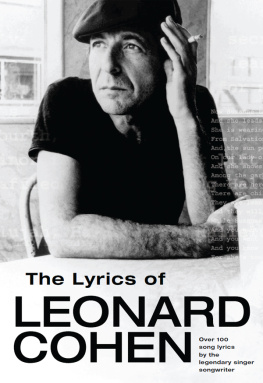
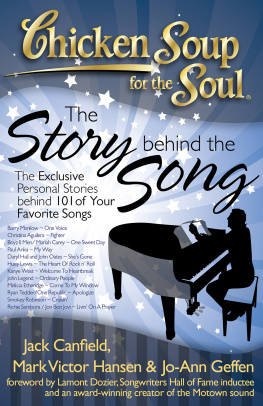
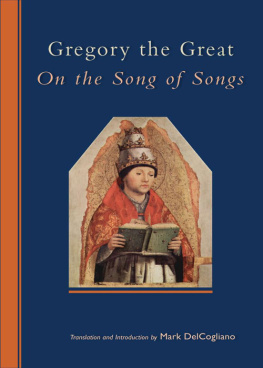
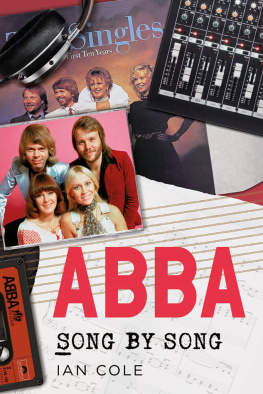
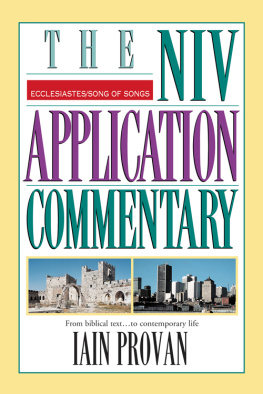
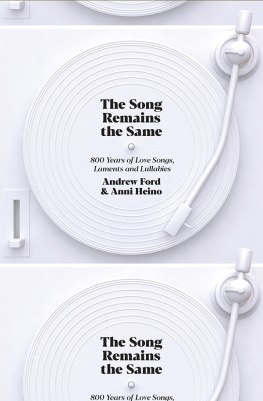
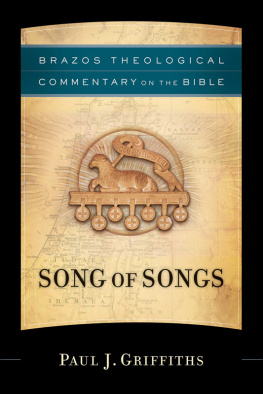

![Othmar Keel - The Song of Songs [Song of Solomon]](/uploads/posts/book/82605/thumbs/othmar-keel-the-song-of-songs-song-of-solomon.jpg)